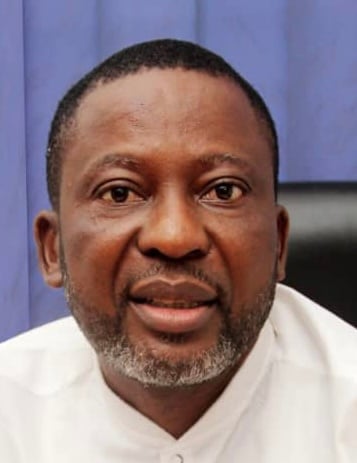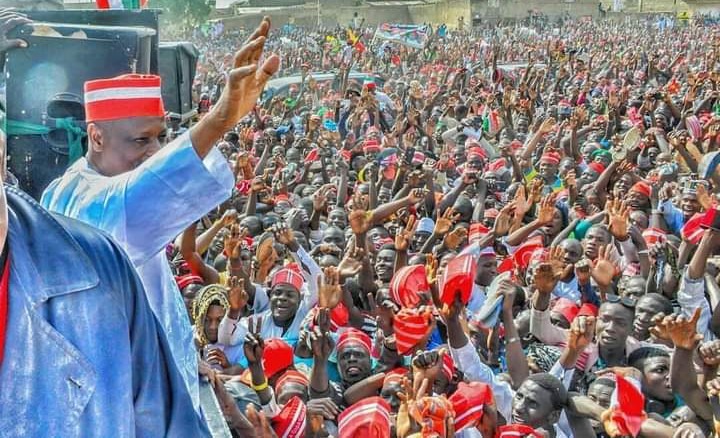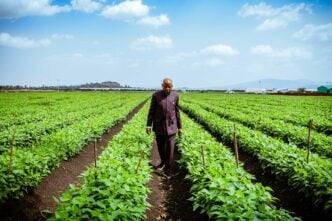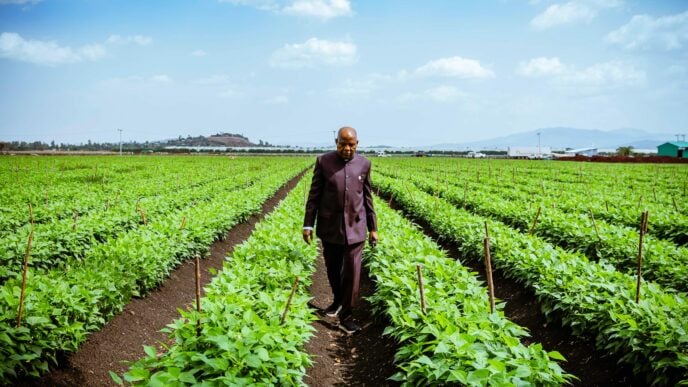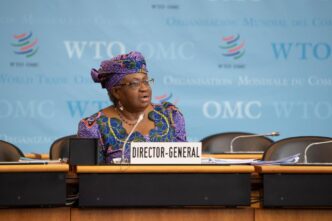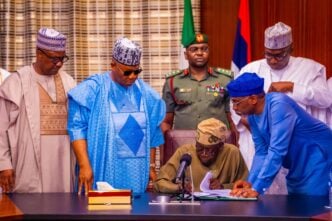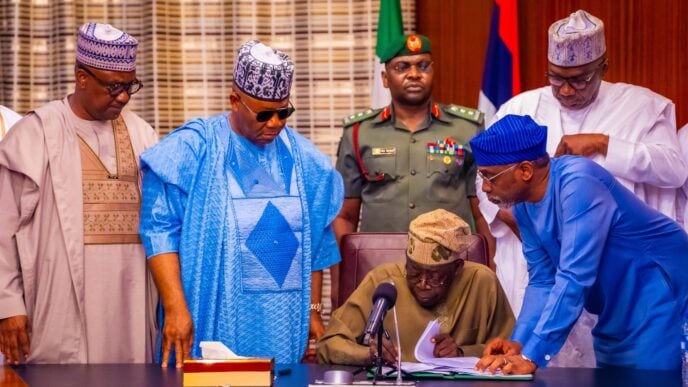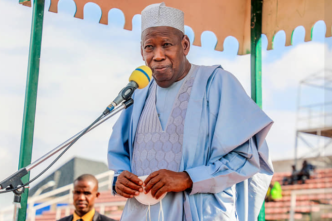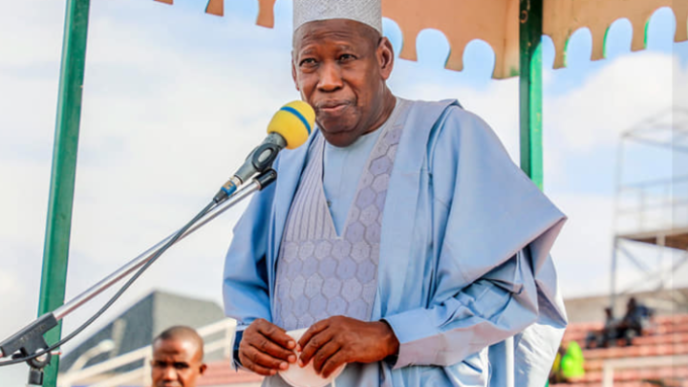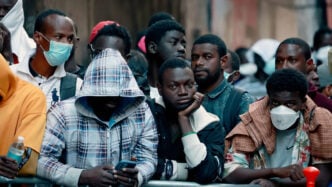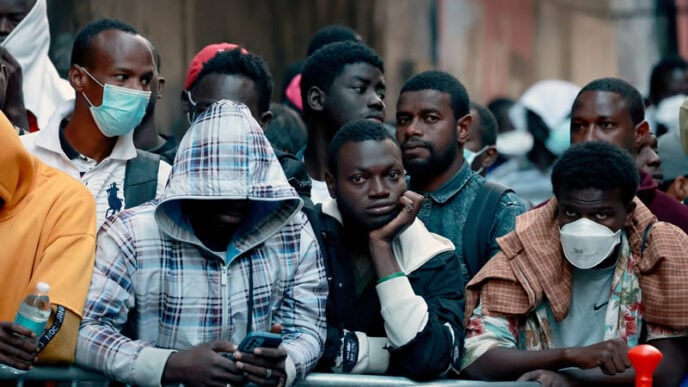By any political barometer, Senator Rabiu Musa Kwankwaso, former governor of Kano State and former Minister of Defense is not your everyday Nigerian politician. He is a phenomenon, an institution built on charisma, grassroots connection, and stubborn ideological defiance.
For years, his political trajectory has been one of rebellion, reform, and resilience. He defied odds to become Governor of Kano State twice, navigated Nigeria’s tumultuous political waters as a Senator, and in 2023 general elections, led the New Nigeria People’s Party (NNPP) to a surprise “third-force”. Yet, today, conversations are shifting: what if Kwankwaso makes the most dramatic move of his career by re- joining the All Progressives Congress (APC)?
This conversation is even made more intense following the sudden resignation of the APC National Chairman, Alhaji Abdullahi Ganduje. While the public narrative suggests “internal restructuring,” insiders and analysts see the move as a calculated sacrifice, a strategic detour, to clear the path for Ganduje’s long-time rival and one of the most influential politicians in northern Nigeria, to rejoin the party.
Ganduje’s resignation is more than just the fall of a party chieftain; it is a political brinksmanship aimed at leveraging the popularity of Kwankwaso in Kano state for huge political fortune come 2027 elections.
Advertisement
The Tinubu administration, increasingly criticized by northern elites of executing “Yoruba agenda” and abandoning the region that largely installed it in power, now finds itself in urgent need of a northern political redeemer, someone with the street credibility, cult-like grassroots following, and electoral weight to bridge a growing trust deficit.
For the APC, Kwankwaso fits the bill. His Kwankwasia Movement is a formidable political platform in Kano state and beyond. For Kwankwaso himself, this “invitation to power” could be the launch pad for the presidency he has long dreamt of.
If he chooses to align with the APC, it will be a gamble but one with high stakes and possibly higher returns. For the party, it would signal a rebirth. For Kwankwaso, it might just be the final chapter in a storied career, the path to Aso Rock that no structure alone could pave, but only influence could unlock.
Advertisement
In a recently circulated and strongly worded statement personally signed by him in last month, Kwankwaso emphasized that the APC has inflicted untold hardship, economic deterioration, and deepened insecurity on Nigerians since assuming power.
He condemned the party’s track record of what he described as “reckless governance, policy failures, and a disconnect from the everyday realities of the Nigerian people.”
He said that though the president has personally reached out to him to consider rejoining the party but despite the flattering promises, he made it crystal clear to him that he would rather quit politics entirely than return to the APC, a party that has inflicted immense hardship on Nigerians.
Part of the statement reads: “I wish to state clearly and unequivocally that President Tinubu personally reached out to me on multiple occasions, urging me to return to the APC fold. He called me directly and made several overtures, both in private and through mutual contacts, in a bid to lure me back to a party that I once helped build but ultimately had to leave due to its departure from principle and justice.”
Advertisement
Kwankwaso said that during one of his conversations with the president, he was assured that the party will meet all the conditions he gave before he can rejoin the fold. “Despite the flattering promises, I made it crystal clear to him (Tinubu) that I would rather quit politics entirely than return to the APC, a party that has inflicted immense hardship on Nigerians”, he said.
At face value, this idea borders on irony. For long, Kwankwaso has dismissed the APC as an unfit house of contradictions, a political contraption built on shifting sands. But the big question that stares Nigerians in the face is: could Kwankwaso’s long-standing rivalry with Abdullahi Ganduje, former Kano governor and immediate past APC National Chairman, the reason he never wanted to do anything with APC? Was Ganduje sacrificed to accommodate Kwankwaso in the party?
But politics, like war, obeys the law of strategic necessity. And 2027 is not just another election year, it is a turning point in Nigeria’s democratic journey. The ruling APC, battered by public discontent, internal cracks, and a leadership struggling with economic hardship and insecurity, faces the monumental task of renewal or rejection. In that context, Rabiu Kwankwaso will not just be another defector, but a potential political dividend too significant to ignore.
The most potent threat to Tinubu’s 2027 ambition is not just the anger of the masses, it is the quiet convergence of powerful political rivals, former allies, and embittered party insiders who are now aligning, not out of love for one another, but out of a shared goal: “Stop Tinubu.”
Advertisement
From PDP governors who feel sidelined in national politics, to the anti-Tinubu northern elites led by el-Rufai the ground swell of opposition to Tinubu’s reelection is growing by the day.
This has prompted Tinubu to turn to what he knows best: the politics of bargaining, coalition-building, and recruiting influence as a substitute for popularity.
Advertisement
With 2027 drawing closer, Kwankwaso now finds himself at the centre of Nigeria’s political chessboard. The APC is rumored to be considering offering him the Vice Presidential ticket — a power-sharing arrangement meant to seduce his northern base and tap into his electoral machinery.
On paper, the deal seems attractive: national visibility, institutional resources, and a credible path to the presidency by 2031.
Advertisement
But beneath the surface lies a more sobering possibility: that Kwankwaso could simply be a means to an end, a disposable political tool to retain northern votes for a southern presidential candidate, only to be discarded post-election. It’s a tactic as old as Nigerian politics itself: bait the North, win the votes, then shift the power dynamics.
This isn’t the first time northern political figures have been wooed into national alliances with promises of future power. Think of Atiku Abubakar under Olusegun Obasanjo, or Namadi Sambo under Goodluck Jonathan, both powerful in their zones, yet relatively politically neutered in the larger governance arrangement. The question before Kwankwaso is simple: will history repeat itself — or will he rewrite it?
Advertisement
Unlike some of his predecessors, Kwankwaso commands an ideological movement, not just political followers. The Kwankwasiyya movement has shown remarkable staying power and electoral resilience, especially in Kano and some northern states. This gives him leverage — but only if he negotiates from strength, not desperation.
Kwankwaso’s political capital is not limited to titles. It resides in the enduring loyalty of the “Kwankwasiyya Movement” — a cult-like following of red-capped supporters across northern Nigeria, especially in Kano, which remains one of the most electorally decisive states in the country.
In 2023, with limited structure and resources, Kwankwaso’s NNPP clinched Kano decisively and carved out a national conversation on third-force politics. This feat was not achieved because of strong party infrastructure; it was the result of influence.
And therein lies the point: APC needs influence more than it needs more structure. The party already has a bloated organizational skeleton. What it lacks is a charismatic mobilizer to inject fresh electoral energy and grassroots vibrancy and Kwankwaso offers just that.
Should Kwankwaso take the bait, the immediate effect will be seismic. APC’s northern base would be reinvigorated. Disillusioned northern voters, who see the current Tinubu-led APC government as indifferent to their economic and security concerns, may find renewed hope. Kano, long the electoral goldmine of the North could be locked down, and other states like Jigawa, Katsina, and Kaduna may follow suit. It would be the shockwave APC needs, a game-changing recalibration of political arithmetic.
However, Kwankwaso risks alienating his core loyalists, many of whom view the APC as the embodiment of everything he has fought against — elitism, betrayal, and exclusion.
If his move is perceived as opportunistic or transactional, he may find his influence diluted, his movement fractured, and his legacy tainted. In other words, he may win the vice presidency and lose the soul of Kwankwasiyya.
Many of Kwankwaso’s loyalists would see such a move as a betrayal of principle especially after years of painting the party as the face of Nigeria’s dysfunction. He may risk a portion of his credibility and the pain could also be personal, not just political.
But politics in Nigeria has a short memory and a long eye on the future. Should Kwankwaso be able to navigate internal politics, he would likely emerge as the northern arrowhead in APC’s 2027 equation, potentially positioning himself as either kingmaker or king.
With President Tinubu constitutionally limited to one more term and internal power tussles looming, Kwankwaso could stake a bold claim on the presidency, representing a powerful northern resurgence within a fractured ruling party.
In a political climate where structure is often mistaken for power, Kwankwaso’s case reminds us that influence and cult followership remain the ultimate currency. While other politicians trade loyalty for relevance, Kwankwaso has maintained a rare authenticity.
His ability to mobilise people, shape narratives, and tilt electoral outcomes even outside of Nigeria’s traditional party machines proves he is greater than any banner he flies under.
The APC, facing diminishing returns from old alliances and internal fatigue, may find its best bet in a man who once stood outside its gate, fists clenched in protest. But now, with an open hand and strategic ambition, Kwankwaso may become its most valuable political dividend yet, not just for 2027, but for the future shape of Nigerian politics.
Senator Rabiu Musa Kwankwaso now stands at a historic intersection. He can maintain his third-force purity and risk political isolation, or he can seize the APC lifeline and with it, a genuine shot at national power. But this is no ordinary defection; it is a test of strategy, legacy, and foresight.
If played right, Kwankwaso could redefine APC and rewire the path to the Nigerian presidency.
Okoronkwo, a leadership and good governance advocate writes from Lagos and can be reached via [email protected]
Views expressed by contributors are strictly personal and not of TheCable.
